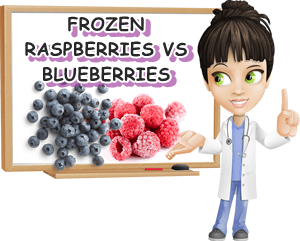Seasonal summer fruits are available off-season as frozen fruits.
The benefit of frozen fruits is they preserve about the same nutritional value they had while still fresh which is great news for anyone even minutely interested in food nutrition and eating healthy.
The bulk of frozen fruit options is represented by berries which are the hardest to come by fresh come fall and winter.
And the two big contenders for favorite frozen berries are raspberries and blueberries. Some people have a clear preference for one over the other, but not everyone is that decided on the topic.
If you like both equally, as in don’t necessarily favor one or the other because of taste or other organoleptic preferences, then you might find it hard to choose between the two.

But is there even a need to choose? That is, aren’t frozen raspberries and frozen blueberries just as good to eat? Factually speaking, different foods differ in the nutrition they provide, sometimes quite measurably.
When comparing two foods, one will always stand out as being more nutritious or better for you.
So which is better between frozen raspberries and frozen blueberries?
Frozen raspberries vs frozen blueberries
Nutrition Facts: Comparison for 1 CUP (150 grams)
1) Frozen raspberries and frozen blueberries have about the same number of calories
One cup of frozen raspberries at 150 grams can get you about 80 kcal (kilocalories, calories), while one cup of frozen blueberries, also 150 grams, has about 76 – 77 kcal.
If calories are what you’re most interested in, then you can go for either one of the two fruit and risk nothing.
2) Both frozen berries have about the same amount of carbs, but raspberries’ are healthier
How many carbs in frozen raspberries vs frozen blueberries? Well, one cup of frozen raspberries at 150 grams of fruit per cup gets you almost 18 grams of carbs.
One cup of frozen blueberries, also 150 grams of fruit, can get you a little over 18 grams of carbs.
The difference in carbohydrate content between frozen raspberries and blueberries is minor, negligible in the grand scheme of things that is daily carb requirements.
However, frozen raspberries have more fiber that counts towards the total number of carbs, whereas frozen blueberries have more sugar, double the amount. This alone makes frozen raspberries the better choice between the two.

3) Frozen blueberries have almost two times more sugar than frozen raspberries
How much sugar in frozen raspberries vs blueberries? One cup of frozen raspberries, unsweetened, can get you 6.6 grams of actual sugar vs one cup of frozen blueberries which can get you 12.7 grams of sugar. The difference is major and makes raspberries the better choice from this point of view.
4) Frozen raspberries have more than double the fiber content compared to frozen blueberries
How much fiber in frozen raspberries vs blueberries? One cup of frozen raspberries has 9.75 grams of dietary fiber which is almost 35% of all the dietary fiber the average adult person needs in a day. By comparison, one cup of frozen blueberries has 4.05 grams of fiber which accounts for only 14.5% of daily fiber requirements for an adult person.
While frozen raspberries are definitely the better choice when it comes to fiber content, both berries are great foods to get your fiber from so you’re good with either one.
5) Frozen raspberries have almost 10 times more vitamin C compared to frozen blueberries
How much vitamin C in frozen raspberries vs blueberries? One cup of frozen raspberries has almost 44% of all the vitamin C the average adult person should get in a day, while the same amount of frozen blueberries covers only 4.2% of daily vitamin C requirements. This means that frozen raspberries have about 10 times more vitamin C per cup than frozen blueberries.
6) Frozen raspberries have 3.2 times more vitamin B5 than frozen blueberries per cup
One cup of frozen raspberries covers an impressive 12% of daily vitamin B5 requirements for an adult person whereas one cup of frozen blueberries covers only 3.75% of daily vitamin B5 values. Pantothenic acid, aka vitamin B5, is needed for maintaining elevated energy levels, for skin and hair health.
It supports nervous system activity, with benefits for muscle function and sleep, and is involved in maintaining good disposition and boosting productivity levels, among other benefits.
7) Frozen raspberries have almost double the vitamin E content, but frozen blueberries have more than double the vitamin K content
If you go for frozen raspberries, then you’ll be getting close to 9% of all the vitamin E you need in a day in just one cup (150 grams of frozen berries). By comparison, frozen blueberries will get you 4.8% of daily vitamin E values for the same amount. Vitamin E is fat-soluble and raspberries have more seeds which contain fatty acids, hence the higher vitamin E content.
But if you go for frozen blueberries, you’ll be getting an impressive 20.5% of your daily vitamin K values per cup (150 grams of frozen berries). By comparison, the same amount of frozen raspberries will get you just 9.75% of daily vitamin K.
8) Neither have any vitamin D, vitamin B12, and barely any vitamin A
Whether you choose frozen raspberries or frozen blueberries, know that you won’t be getting any vitamin D and any vitamin B12. Both are very low in vitamin A, covering only about 0.33% of daily values for a cup of frozen berries.
9) Frozen raspberries and frozen blueberries are both almost sodium-free
One cup of frozen raspberries gets you just 0.065% of daily sodium values, or less than 0.1% which essentially qualifies as being sodium-free. One cup of frozen blueberries also gets you just 0.065% of daily sodium, which is also less than 0.1%.
How much sodium a day? The average adult person can get up t0 2300 milligrams of sodium in a day without side effects. Both frozen raspberries and frozen blueberries are equally good for you if you need to cut back on your sodium intake.
10) Frozen raspberries get you almost 3 times more copper than frozen blueberries
One cup of frozen raspberries provides 15% of daily copper values for an adult person vs one cup of frozen blueberries provides 5.5% of daily copper. Copper is involved in maintaining hair, skin and iris pigment and is an important antioxidant, scavenging harmful free radical molecules.
Copper is involved in ‘cellular respiration, cellular utilization of oxygen, DNA and RNA reproduction, maintenance of cell membrane integrity’, among other functions (study).
11) Frozen raspberries are high in manganese with over 4 times the content in frozen blueberries
A cup of frozen raspberries at 150 grams provides close to 40% of all the manganese the average adult person needs in a day. By comparison, the same amount of frozen blueberries has just 9.5% of daily manganese requirements. Manganese is an important antioxidant, playing a key role in the body’s natural antioxidant defense system.
12) Frozen raspberries have more than 3 times the calcium content of frozen blueberries and 6 times more zinc
If you choose frozen raspberries over frozen blueberries, you’ll be getting more than 3 times the calcium content, 6 times more zinc, 4.4 times more magnesium, 3.8 times more iron, 2.6 times more phosphorus and 2.8 times more potassium.
However, both frozen raspberries and frozen blueberries are very low in calcium, zinc, magnesium, iron, phosphorus and potassium. One cup of frozen raspberries will get you under 6% of daily values for iron and zinc, at best, and less for other minerals. One cup of frozen blueberries will get you less than 2% of daily values for all of these nutrients.
13) Frozen raspberries have 3 times more folate than frozen blueberries
How much folate (vitamin B9) in frozen raspberries vs frozen blueberries? One cup of frozen raspberries has 7.875% of daily folate values for an adult person while one cup of frozen blueberries has only 2.625% of daily values which is 3 times less.
However, frozen blueberries have more vitamin B6 than frozen raspberries: 5.2% of daily values for an adult vs 4.88% of daily values which is 1.1% more. But frozen raspberries have 1.1 times more vitamin B3 compared to frozen blueberries – 5.6% of daily values vs 4.9%. Both berries have the same content of vitamin B1 and almost the same content of vitamin B2.
Also see:
- The nutrition facts for one cup of frozen blueberries (150 grams).
- The nutrition facts for one cup of frozen raspberries (150 grams).
